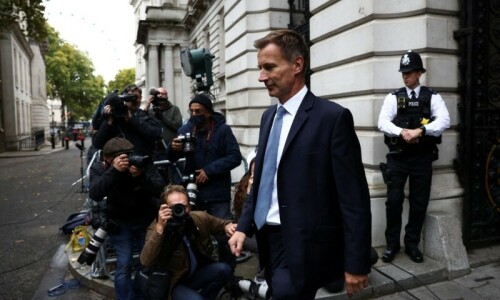Britain’s Prime Minister Liz Truss on Sunday vied to reboot her economic programme, but Conservative critics warned the party faces electoral oblivion under her crippled leadership.
With even US President Joe Biden joining in attacks on her libertarian platform, Truss admitted it had been a “wrench” to fire her friend Kwasi Kwarteng as chancellor of the exchequer on Friday.
But writing in the Sun newspaper on Sunday, she said: “We cannot pave the way to a low-tax, high-growth economy without maintaining the confidence of the markets in our commitment to sound money.”
That confidence was jeopardised on September 23 when Kwarteng and Truss unveiled a right-wing programme, inspired by 1980s US president Ronald Reagan, of 45 billion pounds ($50 billion) in tax cuts financed exclusively by higher debt.
Markets tanked in response, driving up borrowing costs for millions of Britons, and the Conservatives’ poll ratings have similarly slumped, leading to open warfare in the governing party mere weeks after Truss succeeded Boris Johnson.
“I think the game is up, and it’s now a question as to how the succession is managed,” senior Tory MP Crispin Blunt said on Channel 4.
Truss has been forced into a screeching policy U-turn which cost Kwarteng his job. But she depressed the bond markets even more with a painful press conference on Friday and the government was nervously awaiting the resumption of trading on Monday.
Bidding to placate investors, Kwarteng’s replacement Jeremy Hunt is now warning that taxes may in fact have to rise and is pressing for spending restraint by his cabinet colleagues even as Britons endure a cost-of-living crisis.
The new chancellor met the prime minister at her country retreat on Sunday to thrash out a new budget plan which he is due to deliver on October 31, effectively demolishing the “Trussonomics” programme that brought her to power.
Who’s in charge?
“It’s going to be very, very difficult, and I think we have to be honest with people about that,” Hunt told the BBC — prompting a warning from trade unions of concerted strike action if he enforces painful cuts.
Hunt said he was “not taking anything off the table”, but also defended Truss.
“She’s been willing to do that most difficult of things in politics, and that is to change tack,” he said, adding: “The prime minister’s in charge.”
But many questioned that verdict.
“Truss has become a pointless prime minister — an empty vessel with no policies or power,” the Sunday Times editorialised.
The Treasury declined to confirm reports that Hunt plans to delay a planned cut to the basic rate of income tax, removing yet another headline measure announced by the new government last month.
Up to 100 letters expressing no confidence in Truss have been submitted by Tory MPs, the Sunday Times and Sunday Express said.
Opponents were said to be coalescing around Truss’s defeated leadership rival Rishi Sunak and another one-time foe, Penny Mordaunt, for a possible “unity ticket” to rebuild the stricken Tories.
Defence Secretary Ben Wallace could be another compromise candidate for leader, the Sunday Mirror reported.
‘Libertarian jihadists’
“I worry that over the past few weeks, the government has looked like libertarian jihadists and treated the whole country as kind of laboratory mice in which to carry out ultra, ultra free-market experiments,” Tory MP Robert Halfon, who supported Sunak, told Sky News.
“Of course, colleagues are unhappy with what is going on, with haemorrhaging in the opinion polls,” he said.
“It’s inevitable that colleagues are … talking to see what can be done about it.”
Fellow Tory Alicia Kearns, newly elected as chair of the powerful foreign affairs committee in the House of Commons, also questioned Truss’s prospects for survival.
“It’s a very difficult one,” she told Times Radio. “We’ve had questions around our moral competency [under Johnson]. We’ve now got questions around our fiscal competency.”
But Johnson loyalists — still seething at Sunak’s perceived disloyalty towards the scandal-tainted former leader — warned against a coronation that cuts out Tory grassroots members.
Any new leader would face strong pressure to call an early general election, and the opposition Labour party has streaked far ahead in the polls.
Hunt at least has won an important endorsement from Bank of England governor Andrew Bailey, who had to rescue UK pension funds from the dismal market consequences of the Truss-Kwarteng plan.














































